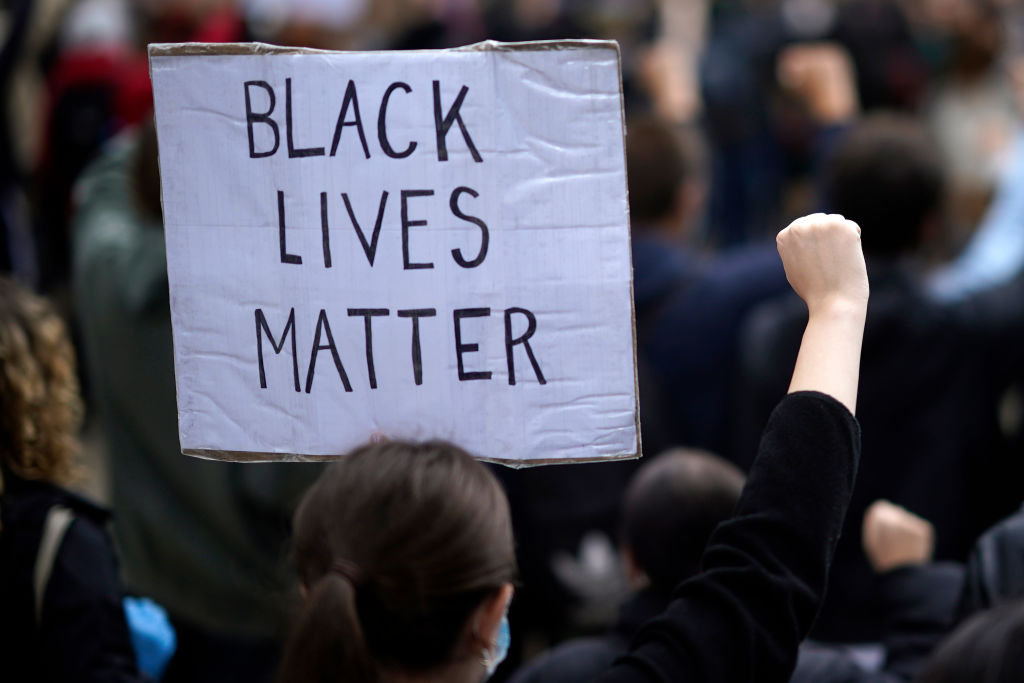Edward Colston sleeps with the fishes. A mob of Bristolians has toppled the statue of one of their city’s founding fathers, Saddam-style, and lobbed the poor fellow into the docks. Other footage on social media shows protesters kneeling on his brass neck, as if he had something to do with modern-day police brutality in the United States. What on earth has caused this madness, which looked like violent scenes from the English reformation?
As is obvious, it’s not really much to do with George Floyd, the man suffocated to death by police last month in Minneapolis. The controversy around Colston has been raging for years in Bristol. A mega-rich philanthropist around the year 1700, he is the nearest thing the city has to a patron saint. The largest stained glass window in the cathedral there is dedicated to him. ‘Go and do thou likewise,’ it commands.
There’s no doubt Bristol owes Colston. He funded almshouses and schools there; made countless donations to churches and charities, some of which work wonders to this day. And many signs of Victorian civic gratitude to him litter the place. There are half a dozen Colston roads and three Colston schools, for instance — including one which churns out more England rugby players than Eton creates prime ministers. Colston is, or was, so venerated that local schoolchildren are occasionally taken on field trips to see a clump of his hair and his nails, which are preserved like medieval relics at the Merchants’ Hall. Beside the toppled statue of Colston — on Colston Avenue — is a plaque proclaiming him to be ‘one of the most virtuous and wise sons’ of the city.
When I last saw the statue, Colston’s hands and face had been splattered with whitewash. For years, students have been pacing about with banners, calling for it to be pulled down. It has been Bristol’s own version of the Rhodes Must Fall campaign, which clamoured for the removal of the statue of Cecil Rhodes from Oxford University’s Oriel College, on the grounds that he was racist. Rhodes Must Fall plagued Oxford for years; Rhodes quite rightly remains upright.
I went to Bristol in 2017, thinking that Colston probably shouldn’t fall, and that this story was just another example of juvenile activism. To my surprise, though, I came away thinking the protestors against Colston had a point after all.
Roger Ball, a member of the ‘Countering Colston’ group, is an aircraft engineer and a sort of hobbyist historian. In almost resigned tones, he explained to me why ‘Colston is not someone we should be celebrating.’
Colston made some of his fortune in the Royal African Company in the late 17th century. At the time, it had a complete monopoly over the slave trade from west Africa, transporting about 85,000 enslaved Africans across the Atlantic, including 12,000 children as young as six – perhaps, one could argue at a stretch, George Floyd’s ancestors. All of them were branded — hot irons on flesh — with the initials ‘RAC’. Roger Ball says just under a quarter, 19,300, including 2,500 children, died during the crossings, in filthy conditions. Colston was eventually the deputy governor of the company that oversaw this horrendous business. It’s absurd, argues Ball, to pretend he was some sort of moral hero to be honoured.
The Countering Colston group, I found, are as thoughtful and measured as Rhodes Must Fall are hysterical and vituperative. They don’t wish to wipe his name from the city. But Joanna Burch-Brown, a philosophy lecturer at Bristol University, tells me they think ‘the cathedral and other churches should stop hosting ceremonies presenting him as a symbol of the good Samaritan’.
David Olusoga, a black Bristolian, broadcaster and historian, puts it starkly: ‘For hundreds of years now — literally — an annual ceremony has been held in Bristol to remember fondly the life and the philanthropy of a mass murderer. Imagine if that were a tradition maintained in the Deep South.’
It’s a powerful argument. I certainly never thought the statue needed to be pulled down, but would it have hurt to add another plaque, explaining that, although Colston was a great philanthropist at home, he was also complicit in death and suffering abroad? Should the cathedral’s window really insist, ‘Go and do thou likewise?’, without any historical context of the life Colston lived? Perhaps, instead of visiting his relics, the schoolchildren of Bristol should be told the full story of his complicated life. People can be heroes and villains. It’s a useful lesson, and one suspects that the Victorians who venerated him after the abolition of slavery really were trying to whitewash Bristol’s past to some extent.
‘To deplore slavers and racists, you have to remember them,’ once said Lionel Shriver in the pages of this magazine. Spot on. Now the protesters, after more than a century of adulation for Edward Colston, and a very selective reading of history by his supporters, are going too far the other way by trying to erase him from history. It isn’t right. Colston should be fished out of the docks and put back.
This article is free to read
To unlock more articles, subscribe to get 3 months of unlimited access for just $5







Comments
Join the debate for just £1 a month
Be part of the conversation with other Spectator readers by getting your first three months for £3.
UNLOCK ACCESS Just £1 a monthAlready a subscriber? Log in